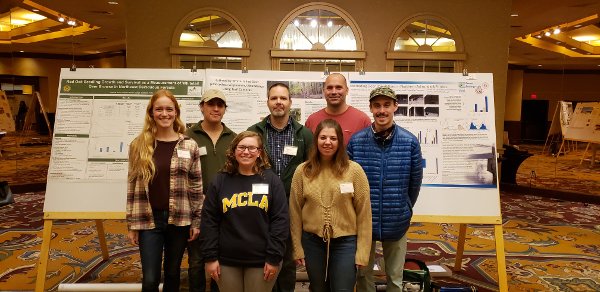Sharing Knowledge at the Northeast Natural History Conference
May 15, 2019

Hannah Poplawski ‘21, Hannah Wait ‘21, Jaret Gonzalez ‘19, Rosalee Walter ’20, Hunter Phillips ’19, and Cassandra Wright ‘22 all attended the Northeast Natural History Conference in April, along with professors Dan Shustack and Eric Doucette.
You could spend hours in the woods tracking dark-eyed juncos—but where do you go from there? One good suggestion: The Northeast Natural History Conference. (But make sure to prepare a presentation first.)
Environmental Studies professor Dan Shustack, whose research focuses on wildlife, particularly Western Massachusetts songbirds like the junco, took six students to the April conference in Springfield, Mass. They presented their research to an audience of their peers, plus professionals in the natural sciences.
“It’s a lot of academics, working professionals in the management and conservation fields, and there are a lot of students that present,” said Shustack. “One thing I hope students will get from these opportunities is learning about other possibilities—learning about what else they could study, where to go to grad school—that’s part of the exposure they get by going to these professional conferences.”
Hannah Poplawski ‘21, Hannah Wait ‘21, Jaret Gonzalez ‘19, Rosalee Walter ’20, Hunter Phillips ’19, and Cassandra Wright ‘22 all attended the conference and presented research on songbirds, deer, insect pollinators and stream ecology.
Gonzalez and Wait have spent over a year working with Shustack, looking at population fluctuations in the local dark-eyed junco population, spending hours walking around North Adams checking their collection sites, banding birds before letting them go, and analyzing bird population data from the National Audubon Society and United States Geological Survey (USGS) to see if it correlates with their findings. “Overall, we saw a population decline,” said Gonzalez.
Committing a year to a research project under the guidance of one professor is uncommon for undergrads, and Shustack is grateful for the continuity. “Field research is so different (from lab research). We’re dependent on seasonality and the natural biology of the species we’re trying to understand,” he said. “Research doesn’t always line up in our academic calendars, and ecological phenomenon happen over longer periods of time than one semester.”
In addition to presenting, Wait ran into a grad student at UMass who she had applied to work with over the summer, sealing the deal for an upcoming internship monitoring nest success in Swainson’s thrush in New Hampshire’s White Mountains.
“I was a little nervous to present because everyone knows so much—but we were all there for the same reason,” Wait said. “It was amazing to get to interact with so many people who have that same level of passion and deep care, and to be able to talk to them about what we were doing, and hear about what they were doing.”
